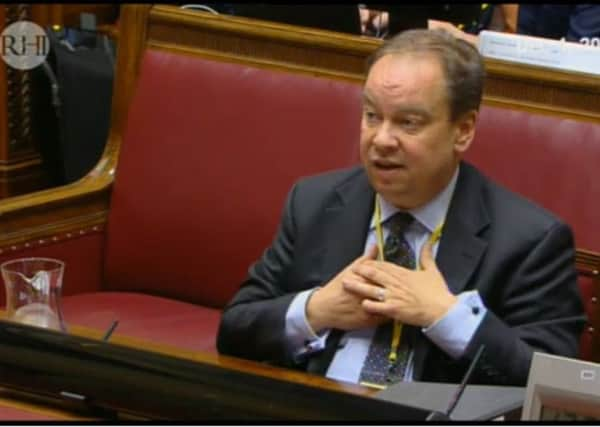Experts who advised DETI on RHI say DETI knew more than they did


Cambridge Economic Policy Associates (CEPA) was the lead consultant in advising Stormont’s Department of Enterprise, Trade and Investment (DETI) on how it should promote renewable heat technologies.
The inquiry has already heard claims that CEPA’s initial 2011 report making a recommendation for a form of grant incentive was softened.
Advertisement
Hide AdAdvertisement
Hide AdThis was said to have come after pressure from the department to change the draft report, due to the department wanting CEPA to give it the basis for a Renewable Heat Incentive (RHI).
Yesterday, during CEPA director Mark Cockburn’s second day giving evidence to the public inquiry into the disastrous scheme, it was put to him that CEPA had been brought in by the department because it had greater expertise than the civil servants in DETI.
Mr Cockburn replied: “The officials with whom we were dealing in DETI had also been responsible for running the Aecom Pöyry report, so in that sense they knew more about renewable heat and RHI than we did when we actually came to start doing the project.”
When asked by junior counsel to the inquiry Donal Lunny if his firm therefore did not add any extra knowledge to the process, Mr Cockburn said: “I’m not saying that. With them, we were learning a new area as we went along – we were applying our modelling skills and economic skills and appraisal skills but to paint this picture that we were the all-seeing experts and that DETI had no idea, I just don’t think...is a true reflection. We all make mistakes, there’s no doubt about that.”
Advertisement
Hide AdAdvertisement
Hide AdInquiry panel member Dame Una O’Brien responded that Mr Cockburn’s comments “make me wonder what was the basis on which you bid for the work and you projected yourselves to take on this responsibility and whether your sense of the lack of expertise was properly set out in the report that you gave?”
Mr Cockburn said that CEPA had worked with firm AEA, who were experts in renewable heat, and had been candid with the department that CEPA itself had no experience in renewable heat.
Dr Keith MacLean, the technical assessor to the inquiry, said that the deficiencies with the CEPA report were not specific to renewable heat, and in particular its failure to prevent over-incentivisation was a common problem in wider energy policy with incentive schemes.
Mr Cockburn later said that CEPA had “not properly thought it through at that time” some of the issues which have subsequently arisen as fundamental flaws in the scheme
Advertisement
Hide AdAdvertisement
Hide AdWhen pressed on that point, he said: “I’m sorry, this is assuming that we had some kind of endless budget to go and think of every eventuality – you’ve seen already, we were sometimes two or three times over budget; these things can go on and on and on.”
Inquiry chairman Sir Patrick Coghlin interjected to say that although that was “of course right... if you felt you weren’t being paid enough, it was up to you to say that and then to make your minds up about whether or not to continue the contractual relationship.
“You were...there as experts; your side of the expertise and [sub-contractor] AEA’s side of the expertise; it seems to me that [those] who, at least on the face of it, were not experts such as departmental officials were entitled to rely on your reputation – which is what’s at stake in this.
“I mean, these are not particularly complicated points – the tariff point, the load factor – and it wouldn’t have taken anything more than to have a straightforward warning in straightforward terms.”
Advertisement
Hide AdAdvertisement
Hide AdMr Cockburn said that he would not have known at the time about the poultry industry in Northern Ireland – which subsequently was encouraged by processor Moy Park and others to join the scheme and had a legitimately high demand for heat.
Later, Mr Cockburn said “I don’t think we had many conversations” about the risk of over-compensation and that the emphasis at the point when the scheme was designed was to make it sufficiently attractive to encourage uptake, later adding that he thought over-compensation to be “a very remote possibility”.
Mr Lunny pointed out that the Whitehall department running the RHI scheme in Great Britain had at that stage already published a document, of which CEPA was aware, which made clear that there was a potential for a perverse incentive or over-compensation.
Mr Cockburn accepted that but insisted that there was “no evidential track record of these things happening”, although he accepted that tiering – something which would have mitigated against over-compensation – should have been recommended by CEPA.